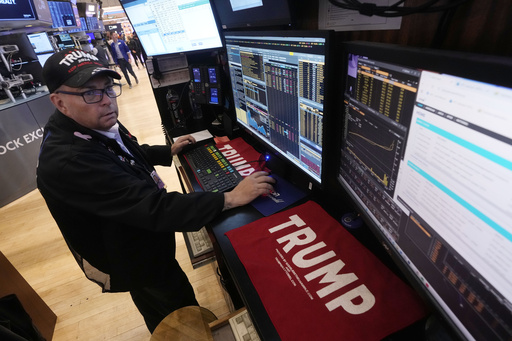
Shares in Asia displayed a mixed performance early on Tuesday as U.S. stock indices experienced a downward trend, just one day prior to the highly anticipated presidential election in the United States.
This week is expected to bring notable points of contention, particularly with Election Day approaching. However, results may not be immediate due to the extensive process of vote counting, generating the possibility of significant market fluctuations due to uncertainty.
Futures for U.S. markets remained relatively stable early Tuesday morning.
The upcoming Federal Reserve meeting later this week adds another layer of potential volatility, as many analysts are predicting a second consecutive cut to the key interest rate.
Additionally, there are hopes among investors for the Chinese government to unveil stimulus measures aimed at rejuvenating its struggling economy.
In Japan, the Nikkei 225 index grew by 1.3% to reach 38,552.67, resuming trading after a holiday on Monday.
Conversely, South Korea’s Kospi saw a decline of 0.7%, settling at 2,569.75, while Australia’s S&P/ASX 200 index dipped by 0.6% to land at 8,117.30.
The Standing Committee of China’s National People’s Congress is currently in session, with many analysts speculating that major spending initiatives may receive approval to bolster economic growth amidst ongoing issues in the real estate sector.
Reports from official sources indicated that legislators reviewed proposals to increase limits on local government debt, designed to manage existing hidden debts and conduct debt swaps to alleviate financial strain exacerbated by the pandemic and the downturn in property markets.
In Hong Kong, the Hang Seng index showed a slight increase of 0.1%, reaching 20,597.30, and Shanghai’s Composite index rose by 0.4% to 3,323.26.
On the U.S. front, the S&P 500 declined by 0.3% to close at 5,712.69, hovering near the record high set last month. The Dow Jones Industrials dropped 0.6% to close at 41,794.60, and the Nasdaq composite fell by 0.3% to 18,179.98.
Intel shares fell by 2.9%, and Dow, a producer of chemicals, decreased by 2.1% following news that they would no longer be part of the Dow Jones Industrial Average. Berkshire Hathaway, led by Warren Buffett, saw a decline of 2.2% after announcing reduced operating profits for the latest quarter.
Despite these declines, the majority of S&P 500 stocks reported gains, including a remarkable 2.8% increase for Fox, buoyed by stronger-than-expected profit reports.
The optimism driving recent record highs in U.S. stock markets stems from hopes of economic resilience, aiming to avoid a feared recession, partly due to anticipated interest rate cuts by the Federal Reserve.
Historically, the U.S. stock market has shown resilience regardless of which political party takes the White House. Rising stocks followed the 2020 election, persisting despite uncertainty when former President Trump disputed the results, with excitement sparked by COVID-19 vaccine developments.
A Trump win this election may evoke less surprise among investors than in 2016, when Treasury yields soared amid expectations of tax reforms that could inflate national debt or bolster the economy. Recent weeks have already seen a rise in Treasury yields, reflecting increasing expectations of a Trump victory.
On Monday, however, Treasury yields retracted some of these gains, with the yield on the 10-year Treasury falling from 4.38% to 4.29%.
A proxy investment for Trump’s perceived likelihood of victory displayed considerable volatility. After fluctuating throughout the day, Trump Media & Technology Group ultimately saw a gain of 12.4%.
On the commodities front, U.S. crude oil prices decreased by 7 cents to $71.40 a barrel early Tuesday, after a significant rise of 2.8% on Monday, as Saudi Arabia and other oil producers announced delays in planned production increases.
Brent crude, the global benchmark, climbed by 12 cents to a price of $75.20 a barrel, recovering 2.7% on Monday. Despite this, Brent remains down for the year due to concerns over demand levels stemming from China’s economic difficulties.
In foreign exchange markets, the U.S. dollar increased against the Japanese yen, climbing to 152.33 from 152.10, while the euro experienced a slight decline to $1.0876 from $1.0880.
